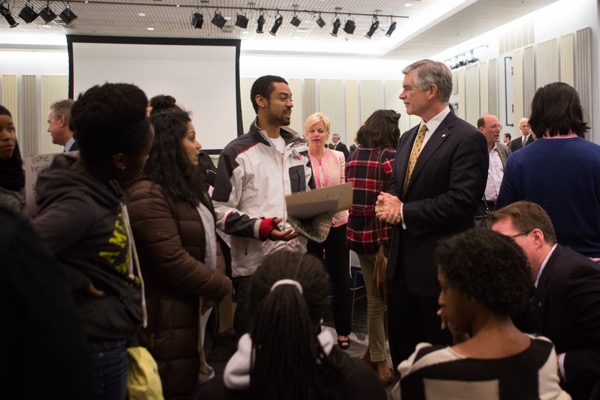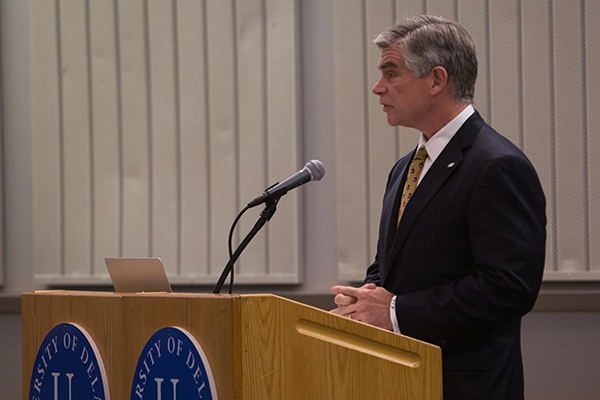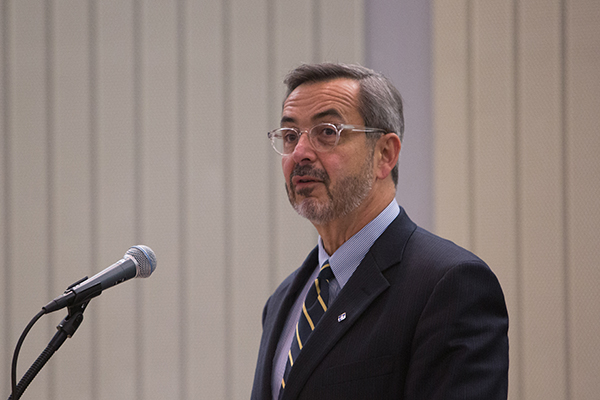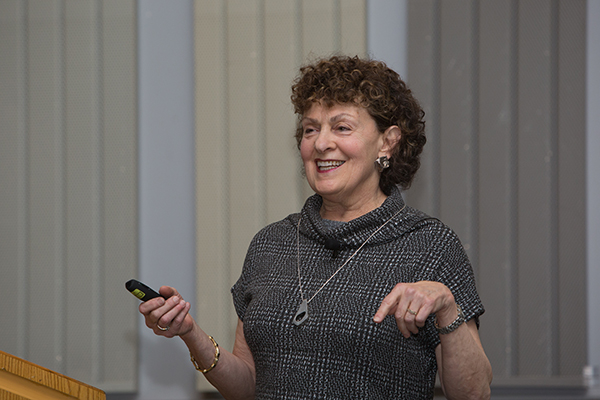


Board of Trustees
STAR Campus, diversity, strategic plan initiatives discussed at board meeting
3:33 p.m., Dec. 10, 2014--A new strategic planning initiative, faculty achievements, diversity efforts and Science, Technology and Advanced Research (STAR) Campus initiatives were among the topics discussed during the University of Delaware Board of Trustees’ semiannual meeting held Tuesday, Dec. 9, in the Trabant University Center.
President Patrick Harker told trustees that the University has launched the “Delaware Will Shine” initiative that will chart UD’s future course.
Campus Stories
From graduates, faculty
Doctoral hooding
Harker also noted that UD has received a prestigious National Science Foundation ADVANCE grant to enhance racial and gender diversity among its faculty.
“As you know, diversity is a bedrock value at the University of Delaware because it strengthens and enriches us all,” Harker said. “We dedicate substantial resources to ensure that every voice is heard, every viewpoint considered, every value respected.”
Harker also lauded UD students, faculty and staff members who took part in in campus demonstration in response to events in Ferguson, Missouri, and New York City.
“The students, faculty and staff who participated are to be applauded for their civility,” Harker said. “They reminded us that a respectful comment speaks louder than any shouted insult or racial slur, and they raised important issues of race and trust, of dignity and inclusion.”
Several UD students attended the board meeting and carried signs showing their concern about those events, and about racist comments posted on a social media website.
“The demonstrations have prompted us to consider how we can move forward together,” Harker said, noting that there is no better place for a free exchange of ideas than a university campus. “In the coming year we’ll keep talking about race in America, in our community and at this University we all love so much.”
STAR Campus and research
Harker also spotlighted the potential of the STAR Campus as a means to grow the University’s considerable contributions to local and regional economic development.
“We see the STAR Campus as an intersection, where we can combine our strengths with those of the public and private sectors, and where we can grow and shape the economy of the 21st century,” Harker said. “The University of Delaware’s role in economic development is something we don’t talk about enough, but it has long been a part of our heritage.”
The development of the STAR Campus site is rooted in the ideas expressed in the Morrill Act of 1862 that created America’s land grant university system, Harker said.
“The creation of the land grant university system was the democratization of education in America, and it is arguably one of the most important developments in our nation’s history,” Harker said. “The Morrill Act led to the creation of Cooperative Extension programs that, this year, are celebrating a century of disseminating practical knowledge to American families.”
Research laboratories at land-grant universities like UD also have fueled innovations that shape modern life, from life-saving medicines to life-changing technology, Harker said.
“The GI Bill that gave millions of veterans an education succeeded largely because of the university system that the Morrill Act had created,” Harker said. “In short, the Morrill Act helped make the United States the largest and most competitive economy in the world.”
When the former Chrysler assembly plant closed in 2008, UD took advantage of the opportunity to turn what could have been an empty site and a drain on the region’s economy into a vibrant center of research activity, innovation and service to the community, Harker said.
“We incorporated much of the old Chrysler administration building, including a mural of the vehicles produced there, into our new Health Sciences Complex,” Harker said. “We moved our Nurse Managed Health Center, the Physical Therapy Clinic and the Delaware Rehabilitation Institute to bigger spaces within the complex. More than 300 patients a week visit those centers as word spread in the community about their high quality of care.”
Harker also cited the GoBabyGo lab that gives kids with disabilities the mobility they need to socialize, learn and grow, and the BADER Consortium that works to improve rehabilitation for wounded troops and others with missing limbs as examples of research labs changing lives for the better.
“We’re going to develop this site to benefit not only our students and faculty, but also the entire region,” Harker said. “It’s going to take a long time, but I believe we’re building something truly incredible at the University of Delaware.”
Faculty and student recognition
University Provost Domenico Grasso updated trustees on faculty and student achievements and the goals of the “Delaware Will Shine” strategic plan initiative.
“What has remained clear to me throughout the year, transitioning from my first year as provost into my second, is that we are a university on a steep upward trajectory, and that we have realized many successes together and we are positioned for an even brighter future,” Grasso said. “While there is no way to completely review all of our many achievements, hopefully my time with you today will provide a glimpse of the ideals that make UD special, such as our commitment to excellence and our belief that diversity and inclusion is instrumental to our success and our sense of community.”
Grasso said that the strategic plan executive committee, under the leadership of Charles Riordan, deputy provost for research and scholarship, has formed three working groups exploring specific assignments, including Models for the New American Research University; Great Debates, Grand Challenges, Big Ideas; and Sustaining and Accelerating the Advance.
Grasso also noted that diversity and inclusion at UD are not abstract values, and that the degree to which UD embraces these goals signals its commitment to fairness, equality and excellence.
“The truth about race is that it affects all of us,” Grasso said. “For some of us, it’s an ever-present challenge and for others among us it’s nearly invisible. Despite its importance, race is not something we often talk about honestly.”
The University’s commitment to excellence “cannot be decoupled from the ideals of diversity and inclusion,” Grasso said.
“As we look ahead to 2015 and our new strategic plan, we must consider how we can all better cultivate an environment in which everyone feels safe, included, that they are treated with dignity and have the opportunity to realize their dreams,” Grasso said. “I have great respect for our students’ continued civic involvement and leadership to help us achieve ever greater engagement around inclusion.”
Grasso noted that Carol Henderson, vice provost for diversity, will be organizing a series of roundtable sessions next semester to engage the campus community in a dialogue around many different aspects of diversity.
Efforts to foster open communication and information by the Provost’s Office include a series of open-format meetings and addressing meetings of the UD Faculty Senate to nurture dialog with faculty leadership, Grasso said.
Research on babies, language
Roberta M. Golinkoff, Unidel H. Rodney Sharp Professor in the School of Education, gave a presentation titled “How Do Babies Learn to Talk?” that featured a discussion on what language is, how its development can be studied and how what is learned about language development can be translated to benefit children.
Golinkoff, the coauthor of How Babies Talk: The Magic and Mystery of Language in the First Three Years of Life, said, “We get the word out. We write books for parents, speak all over the world, appear on National Public Radio and in The New York Times, the Wall Street Journal and on radio and media, and we participate in the White House conference, and tweet.”
Golinkoff also introduced two students from her research team: Julianne Beck, a double major in cognitive science and Spanish from Media, Pennsylvania, who is also a 2013 UD Woman of Promise, a member of the UD Marching Band and a UD tour guide, and Kristina Strother-Garcia, a graduate student in the Department of Linguistics and Cognitive Science from Philadelphia.
Board actions
Among the actions approved by the trustees at the meeting was granting permanent status to the bachelor of arts major in public policy and the bachelor of science degree in neuroscience, both in the College of Arts and Sciences.
Trustees also approved permanent status to the bachelor of science degree program in food science and the bachelor of science degree program in animal and food sciences; and the bachelor of science degree program in pre-veterinary medicine and animal biosciences, all in the College of Agriculture and Natural Resources.
Also approved was the granting of permanent status to the bachelor of arts degree in environmental studies, and changing the name of the Honors Degree in Wildlife Conservation major to the Honors Degree in Wildlife Ecology and Conservation.
The board also passed a resolution to confer an honorary degree on David G. DeWalt, a 1986 UD graduate who is chief executive officer and chairman of the board of FireEye Inc., at the spring Commencement ceremony on May 30, 2015.
In addition, the trustees reelected board members Tony Allen and Allison Burris Castellanos to six-year terms.
Article by Jerry Rhodes
Photos by Ambre Alexander Payne











